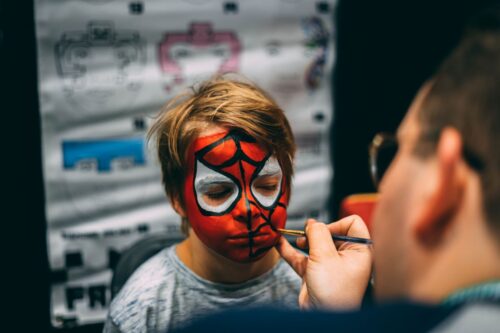
Diagnosis Roadblocks: Why an Adult Autism Test Can Be A Challenge
Why is getting an adult autism test such a challenge? Here are various diagnosis roadblocks and how to overcome them to get answers you seek.
Adult life on the neurodiverse universe

Why is getting an adult autism test such a challenge? Here are various diagnosis roadblocks and how to overcome them to get answers you seek.

If there weren’t enough challenges already, selective eating commonly occurs with autism and contributes to mealtime stress. Here are 8 tips to help.

A myth about autistic individuals is that they have a lack of empathy disorder— the ability to share in feelings of others. This stereotype is inaccurate and hurtful.

Here are powerful ways for people with autism and their loved ones to build a gratitude attitude and a beautiful life.

It’s common to watch scary movies during the Halloween season to get into the holiday spirit. But are horror movies good options for individuals with autism?

Playing dress up and going trick or treating or attending fall festivals can be a positive experience for children with autism. Just keep these things in mind before heading out.

Halloween is a holiday filled with spooks and scares like scary haunted houses, usually in a fun way. However, some individuals experience true terror instead of enjoyment.

Many autistics report periods when their traits become more intense and challenging. They are often referred to as “flare-ups” or autistic regression.

Even grownups enjoy the spooky fun of Halloween. One way to get into the “spirit” is wearing Halloween costumes for adults. But with autism, it may not be simple.

Eye contact is a form of human connection. But it can be extremely uncomfortable for some autistics, resulting in eye contact avoidance.

An adult autistic meltdown can be highly distressing, and the resulting aftermath is often daunting. But there are ways to recover successfully.

It’s been over a decade, but the decision to stop using “Asperger’s Syndrome” as a neurodevelopmental disorder diagnosis remains controversial.

Autism stigmas still persist, despite increased advocacy efforts. Here’s how to champion disability rights in today’s social arena.

How do you officially diagnose autism? Here’s what you should know about the Diagnostic and Statistical Manual of Mental Disorders, known as DSM-5 for ASD.

Autistic staring meaning can be simply a different way of sensory processing. Rather than being creepy; it helps make sense of things.

Autism and friendships can be a challenge. While people often struggle with finding a friend, connections when on the spectrum can be especially hard.

Autism and ADHD are considered similar mental health conditions, as they can present themselves in the same way. It can be confusing.

Everyone is anxious about something. But agoraphobia is intense anxiety with irrational fears, which adversely impact your life if not managed.

Experiencing anxiousness and going from calm to chaos can impact daily life. You may even feel you’re being anxious for nothing. You’re not alone.

Is autism a gene or is it environmental? From examining a possible hereditary link to demonstrating how AI can help those with ASD, here are 11 hot topics.

There are many reasons for incontinence in autistic adults, but nothing to feel embarrassed about! It’s common and can be easily managed.

A common symptom of autism is black and white thinking, or the need to be absolutely right to the point of inflexibility. With it are hefty challenges.

Autism and pets can be a special combination, offering an emotional connection, improved mental health, and enhanced social skills.

Boredom busters alert: It’s okay to be bored with life…sometimes. Boredom results from a lack of engagement. But there are benefits that come from no plans.

A significant issue faced by autistic individuals is ostracism—feeling left out or marginalized. Here’s how you can conquer the emotion.

Is it disrespect, candor, or being overly sensitive? Sometimes the subtle cues can be hard to tell apart, creating challenges for some autistics.

Autistic artisans can expand their world through the unique beauty of their craftsmanship. Whether simple or intricate, the result is impactful.

What is bed rotting? Despite its alarming name, the bed rotting trend refers to spending extended periods in bed, often as self-care. Learn more.

Is using autism as an excuse when a person on the spectrum is behaving badly okay? Sometimes yes, and other times no. Learn more.

For many autistics, small talk or talking to strangers can feel tangled and complex. Here’s how to succeed in the art of conversation.

What you see isn’t always what you get, at least in terms of autism symptoms in adults. The popular iceberg theory helps explain why.

While lack of engagement is a common behavior of autistics, did you know that over socializing or being over friendly is also a problem?

Autism and poor personal hygiene is a common issue, and is often due to sensory issues. But poor hygiene is a smelly challenge that must be tackled.

Autistics face an increased risk of accidental drowning, which is often referred to as a silent death. Learn more about ways to keep everyone safe in the water.

Decision-making skills are essential to live as your authentic self. Sometimes, indecisiveness can cause anxiety . At its worst, it can hold you back.

A fascinating trend has emerged in the autism community: parents of autistic children are learning they too have ASD. Here’s more about late-diagnosis autism.

Have you heard the term “looping in”? With autism, it refers to a state of hyperintense focus, to the exclusion of anything else. Learn more.

Disconnection from verbal and written expression can lead to isolation for people with ISD. Cartooning art offers an alternative for creative minds.

They’re here. Now, they’re not. It’s frightening, and this type of wandering off happens at all ages. Here’s why autism elopement can be a behavioral nightmare.

Autism and eye rolling is not a sign of disrespect. Here are 4 common reasons contributing to this “odd” behavior.